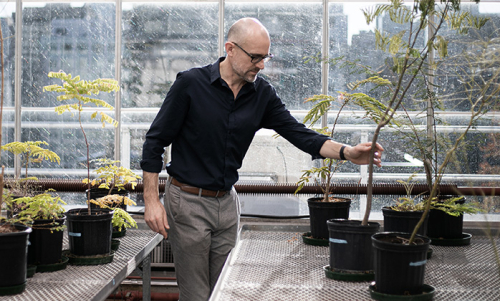“Biological diversity is inherent to healthy ecosystems,” says Andrew Gonzalez, Professor and Liber Ero Chair in Biodiversity in the Department of Biology of McGill University.
“The more resilient an ecosystem is, with the greater variety, the better it supports life and the more we all benefit.”
Today, between 12 and 15 per cent of all species are threatened with extinction, and one half of the world’s ecosystems are in a degraded state. All humanity depends upon ecosystems for our natural resources — but the issue is especially dire for the billions of people globally who rely on the land for subsistence.
“So, this is a big issue,” Gonzalez says. “We are causing what is essentially an irreversible loss, and that’s a shocking moral and ethical problem in and of itself.”
A pressing issue abroad – and in Canada
“The jobs and technologies that depend upon healthy ecosystems are significant for Canada,” Gonzalez says. “For example, our agricultural sector depends on healthy pollinators that sustain our fruit producers. So, it’s very easy to go through the various sectors of our economy and point to how we depend upon nature.”
As Gonzalez notes, biodiversity science is essential to helping industry partners move towards more sustainable — and profitable — practices.
“The world’s businesses have finally realized that the global economy is affected by the collapse of ecosystems,” says Gonzalez. “One estimate from the World Economic Forum is that fully one half of the global GDP is exposed to the risk of collapse because of vanishing ecosystems. So, when that community starts to worry, perhaps the world is finally waking up!”
Communicating research beyond the ivory tower
To conserve biodiversity, researchers need to collaborate with decision-makers across a range of sectors.
“We communicate our work far beyond the ivory tower,” says Gonzalez. That includes talks, policy briefs, and webinars for government ministries, businesses, municipalities, NGOs, and citizen groups.
“People make decisions based on values, not on science.” So, problems relating to biodiversity must be solved by engaging with the social sciences and economics, and by ensuring that biodiversity is embedded in decision-making across all sectors, including health, transportation, and energy.

We can now modify the materials we produce, the impacts of the products that we put into our environment, and that we plant in our fields. “These have cascading influences on biodiversity,” says Gonzalez, “so that involves engaging with the agricultural sector as well.”
And increasingly ecologists and biodiversity scientists are working with Indigenous knowledge holders. “Nature is inherent to their language, their culture, and their traditions. To destroy nature is to destroy ourselves. It took us awhile to catch up to that!”
Helping industry and policymakers see the bigger picture
Gonzalez is founding director of the Quebec Centre for Biodiversity Science (QCBS), which fosters the discovery, monitoring, and sustainable use of biodiversity in Quebec, Canada and around the world. A national and international leader in biodiversity research and policymaking, the McGill-based network is host to 105 researchers and 700 graduate students across 13 universities.
The QCBS is also host to GEO BON, the Group on Earth Observations Biodiversity Observation Network. This international network of 2,000 experts monitors the state of nature around the world, similar to how climate scientists monitor the global weather.
GEO BON collaborates with space agencies worldwide (including NASA and the European Space Agency) to observe and measure forests, grasslands, and coastlines, and assess the state of ecosystems globally.
“We’re working to take the pulse of nature on a daily basis,” says Gonzalez, who serves as GEO BON co-chair. “We’re engaging not only with the space industry, but also with scientists who are observing and measuring nature on the ground — and working to bring those two communities together.”
Science-based evidence for policymaking
The QCBS is also working the Quebec government. “The environment ministry of Quebec (the MDDELCC) came to us at the QCBS and said, help us develop our biodiversity observing network. How can we monitor ecosystems in a way that gives a better understanding of biodiversity trends and supports smarter decisions about the use of our land and waters while protecting biodiversity?”
Gonzalez points to this win-win example of how we can introduce more biodiversity science into policymaking, planning and management. A network such as the QCBS creates a focal point for biodiversity expertise — synergizing collaboration and exchange, and facilitating communication with industry partners.
Accelerating solutions to complex challenges
Gonzalez is also a co-lead of the “Adapting Urban Environments” theme of the McGill Sustainability Systems Initiative (MSSI), a network of researchers at McGill’s two campuses.
The MSSI builds McGill’s sustainability research capacity by connecting researchers across the natural sciences, engineering, social sciences, and humanities. It supports impactful research in sustainability and funds multidisciplinary collaborations that disseminate knowledge to a wider audience.
Gonzalez describes these influential McGill networks as “multipliers” — interdisciplinary collaborations that build a critical mass of expertise, pool knowledge and resources, and strategically focus on key priorities.
“We build more effective communities by working together across disciplines,” says Gonzalez. “Canada should be proud of this expertise. We punch above our weight because we collaborate effectively.”
